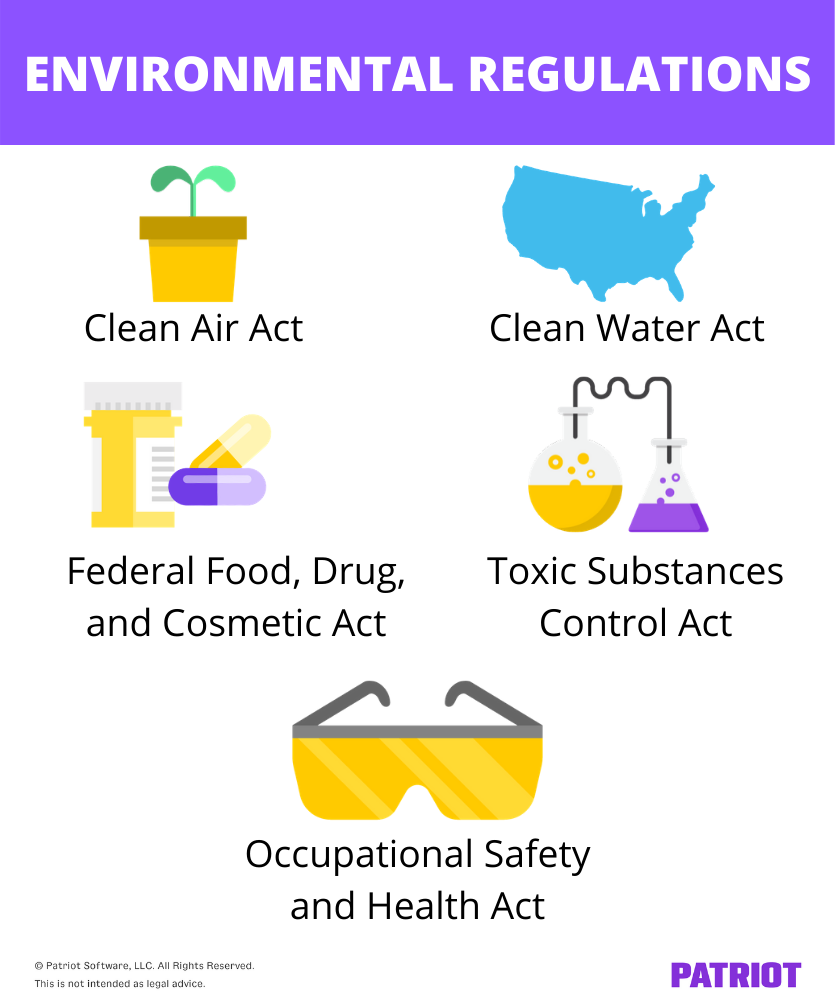Depending on your business, you may work with things that require your compliance with environmental regulations.
The Environmental Protection Agency (EPA) enforces a number of laws that businesses of all sizes must follow. But when it comes to small businesses, the EPA does offer some flexibility.
Read on to learn the basics of EPA regulations and how the EPA accommodates small businesses.
Environmental regulations
The EPA administers a number of federal laws and Presidential Executive Orders (EOs) to protect health and the environment.
Some of the laws that may impact your small business include lean water and air, safe food, and chemical regulations. Before starting or growing your business, make sure you understand these types of laws. Keep in mind that this is not an all-inclusive list.

Clean Air Act
The Clean Air Act (CAA), established in 1970, regulates air emissions from mobile (e.g., vehicles and engines) and stationary (e.g., glass manufacturing plants) sources to limit hazardous air pollutants and protect public health and welfare.
Through the CAA, the EPA sets national standards businesses must follow. These standards are known as the National Ambient Air Quality Standards (NAAQS). Through the act, the EPA also requires states to implement plans to further regulate businesses and achieve the standards.
So, what does this act mean for businesses in layman’s terms? The CAA limits the amount of hazardous air pollutants that agricultural, manufacturing, power plants, or similar industries can emit per year.
If you think these standards may apply to your business, you can learn more on the EPA’s website.
Clean Water Act
The Clean Water Act (CWA), reorganized from the 1948 Federal Water Pollution Control Act, was established in 1972. This act sets standards for surface waters and wastewater.
Surface waters include:
- Lakes
- Rivers
- Streams
- Wetlands
- Coastal areas
The CWA prevents businesses from emptying wastewater or other pollutants into surface waters unless they have a permit. However, some activities, like qualifying farming activities, are exempt from acquiring permits.
Keep in mind that the Clean Water Act is different from the Safe Drinking Water Act (SDWA). The SDWA ensures drinking water is safe, whereas the CWA protects waterways from pollution.
If you want to learn more about the CWA permit program, check out Section 404 of the Clean Water Act.
Federal Food, Drug, and Cosmetic Act
The Federal Food, Drug, and Cosmetic Act (FFDCA) was originally established in 1938. It is enforced by the U.S. Food and Drug Administration (FDA). The act gives the FDA authority to inspect food, drug, and cosmetic products to ensure they’re safe for consumer consumption or use.
But, the main purpose of the FFDCA itself is to limit the maximum allowable pesticide residues on foods.
In 1996, the FFDCA was amended by the Food Quality Protection Act (FQPA). The FQPA further hammered down on pesticide regulations.
If you think your business is impacted by the Federal Food, Drug, and Cosmetic Act or the Food Quality Protection Act, check out the EPA’s website.
Toxic Substances Control Act
Does your business handle chemical substances, mixtures, or both? If so, you need to familiarize yourself with the Toxic Substances Control Act (TSCA) of 1976.
The TSCA regulates the production, importation, use, and disposal of chemicals such as lead-based paint and asbestos.
As part of the TSCA, businesses are responsible for adhering to the following requirements:
- Reporting
- Recordkeeping
- Testing
- Restrictions
You can learn more about the TSCA on the EPA’s website.
Occupational Safety and Health Act
The Occupational Safety and Health Act, or OSHA, is a worker and workplace safety act established in 1970. It is a division of the Department of Labor.
The act sets specific standards for four industries, as well as general standards that all businesses must follow to keep their employees safe from potentially life-threatening hazards.
OSHA sets specific rules for the following industries:
- General industries
- Construction
- Maritime
- Agricultural industries
General OSHA standards require businesses to keep the workplace free from exposure to toxic chemicals, excessive noise levels, mechanical dangers, heat or cold stress, and unsanitary conditions.
Employees who feel their workplaces are unsafe can file an OSHA complaint through the Department of Labor’s OSHA website.
Inspections for EPA regulation compliance
The EPA conducts compliance monitoring through on-site inspections. According to the EPA, inspections include:
- Employee interviews
- Record and report reviews
- Photographs of site
- Sample collection
- Facility or site observations
Failing to follow environmental laws and regulations could result in a pretty hefty bill. To find out if a business is violating EPA regulations, the agency encourages business internal audits and citizen complaints.
EPA rules and small businesses
For some small businesses, keeping up with EPA regulations can be a challenge. As a result, the EPA established the Small Business Regulatory Enforcement Fairness Act (SBREFA).
This act provides greater flexibility for small entities, including small:
- Businesses
- Organizations
- Governmental jurisdictions
The SBREFA has five sections that cater to small business needs:
- Regulatory Compliance Simplification: Federal agencies must use plain language and clear direction in compliance guidelines for small business.
- Regulatory Enforcement Reforms: Federal agencies may reduce or waive penalties if small businesses violate EPA regulations.
- Equal Access to Justice: Small businesses might receive money to cover attorneys’ fees if they are brought to court through excessive federal regulations enforcement.
- Regulatory Flexibility Act Amendments: Small entities can participate in the development of some regulations.
- Congressional Review of Agency Rulemaking: Federal agencies must give Congress copies of rules, and Congress can accept or deny a proposed rule.
Let’s face it: there’s a lot to track when it comes to running your business. One thing you can streamline is your accounting process. How? Give Patriot’s accounting software a try! We offer an easy-to-use platform, U.S.-based support (free), and more. Start your free trial now.
This is not intended as legal advice; for more information, please click here.
Leave a Reply